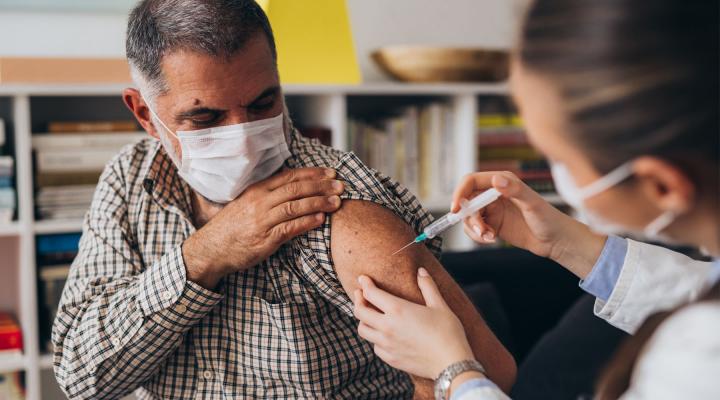
Now, more than ever, it is incredibly important to understand the types of vaccinations that are available if you’re living in Spain, and take them up if you feel they are right for you. Vaccination is incredibly important in the development of herd immunity, and helping to prevent the spread of dangerous and deadly diseases.
If you are eligible for healthcare under the State Health Service then all recommended vaccinations are free in the country, both for children and adults. Around 90% of the Spanish population use the Spanish healthcare system, so this is certainly something to discuss with your regular doctor. Here’s everything you need to know about the Spanish vaccination process, how to understand if you’re eligible, and which vaccinations you could consider receiving:
Vaccinations for Children
Vaccinations for infants and children aren’t compulsory in Spain, but the take up is very high, with a large percentage of the population are in favour of vaccination for their offspring. When they are born, each child living in Spain up to the age of 14 is assigned a health record book via their pediatrician at the local health center (centro de salud). This book will include a list of the vaccinations you child is eligible for, and when they can have them, but it is your role to research this and decide whether you think each vaccination option will be right for your child. If you move to Spain with your children, you should give their up-to-date vaccination record to their new doctor.
The list of vaccinations that children are offered in Spain is outlined below:
- Hepatitis B: at two, four, and 11–12 months.
- Diphtheria, tetanus, and acellular pertussis vaccine: at two, four, and 11–12 months; additionally, a booster dose is provided anywhere between 12–18 years old.
- Inactivated Polio Virus vaccine (IPV): at two and four months; additionally, booster doses are provided at 11–12 months and six years old.
- Haemophilus influenzae type b conjugate vaccine (Hib): at two and four months; additionally, a booster dose is provided at 11–12 months.
- Pneumococcal conjugate vaccine (PCV): at two and four months; additionally, a booster dose is provided at 11–12 months.
- Meningococcal C conjugate vaccine (Men) and meningococcal ACWY conjugate vaccine (MenACWY): at four months, 12 months, and 12 years old.
- Measles, mumps and rubella vaccine (MMR): at 12 months and a second dose between two and four years old.
- Varicella vaccine (Var): at 15 months and a second dose between two and four years old.
- Human papillomavirus vaccine (HPV) (girls only): at 11–12 years old.
- Meningococcal B vaccine (Men): at two, four, and six months; additionally, a booster dose is provided between 12 and 15 months.
- Rotavirus vaccine (RV): at two, four, and six months.
Travel Vaccinations When Living in Spain
It is not necessary to have any vaccinations when travelling to Spain: you can just hop on a plane and enjoy your trip! But there are many other parts of the world where you will need to protect yourself with vaccinations before you travel and, if you’re living in Spain, you can have these via your local travel clinic. Discuss this with your primary care physician, who can give you more information. The travel vaccinations currently offered in Spain are:
- Cholera
- Diphtheria, tetanus, and polio
- Hepatitis A
- Hepatitis B
- Japanese encephalitis
- Malaria tablets
- Meningococcus
- Mumps, measles, and rubella
- Rabies
- Tick encephalitis
- Tuberculosis
- Typhoid
- Yellow fever
Annual Influenza vaccinations
Annual influenza vaccinations are recommended for certain groups in Spain. If you fall into one of these groups then your influenza vaccination will be free. These include, but are not limited to:
- Anyone over 64 years of age
- Pregnant women, particularly those whose pregnancy falls during the winter months
- those at any age who have medical disorders and are at increased risk for severe complications from influenza, such as healthcare workers and residents of nursing homes or other chronic care facilities.
- Anyone considered to be in a high-risk group
Paying for Your Vaccinations
Although Spain is divided into 19 different regions, and these are ruled autonomously, the country has its own national vaccination schedule, and this is followed in all regions, so the vaccinations you or your child will need should be the same regardless of where you live in Spain. Almost all of these are free of charge, with the state health service providing essential healthcare for children up to the age of 14.
For those vaccinations which aren’t deemed medically necessary and therefore aren’t provided free of charge (travel vaccinations, for example, where you are choosing to take a holiday to a country in a vaccination zone) many private health insurance providers will cover the cost of these vaccinations. Discuss this with your insurer before you book your appointment.
Are you thinking of moving to Spain? Perhaps your family is looking for a new and exciting change, or you’re hoping to retire to somewhere sunny? Then why not get in touch with our locally based property experts. We’re perfectly placed to help you find the Spanish home of your dreams.

 English
English Español
Español Deutsch
Deutsch Français
Français Svenska
Svenska Nederlands
Nederlands Italiano
Italiano Norsk
Norsk Русский
Русский

































